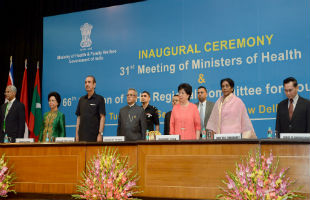
Director-General of the World Health Organization, Dr Margaret Chan is in India from 10-13 September 2013 to discuss key health issues facing the South-East Asia region.
She addressed these issues at the joint inauguration of the thirty-first Meeting of Health Ministers of the Region and the sixty-sixth session of the WHO Regional Committee for South-East Asia, in Delhi on 10 September 2013.
Dr Margaret Chan shared the stage with the President of India, Shri Pranab Mukherjee, Union Health Minister, Shri Ghulam Nabi Azad along with other important dignitaries. At the inauguration, she commended India for its polio eradication programme along with other achievements. She also urged nations of the region to adopt universal healthcare access for all.
Dr Chan also delivered the keynote address at the ‘International Conference on Public Health Priorities in the 21st Century: The Endgame for Tobacco’ on 11 September 2013. She acknowledged and shared the great sense of urgency, the impatience with the pace of progress, and the desire to seize the brave new promise of a tobacco endgame.
Addressing the sixty-sixth session of the Regional Committee for South-East Asia, on 11 September 2013, Dr Chan commended the region for the way it has responded to calls to move health systems towards universal coverage.
“Your draft resolution on universal health coverage addresses the need for countries to conduct assessments of health technologies and interventions as a strategy for the more efficient use of resources,” she said.
Dwelling further, Dr Chan said that UHC brings important social dividends as well. In the absence of public spending policies that make equity an explicit objective, economic growth will not automatically give the poor a decent life.
“Policy choices, such as those embodied in universal health coverage, make the difference,” she added.
Dr Chan was appreciative of the consensus on the goal of measles elimination and rubella control by 2020.
“Routine immunization is the foundation,” she said.
Speaking about the prevention and control of noncommunicable diseases, Dr Chan said, “SEAR health experts have given equally careful attention to the regional action plan and targets.”
Dr Chan felt that this region can be a model of how the prevention and control of NCDs, and the monitoring of trends, can operate within the context of primary health care.
She was happy to note that all countries in this region have completed a critical assessment of weaknesses in their national policies for essential medicines.
“This is a solid starting point for improving the regulatory control and rational use of medicines and other medical products,” said Dr Chan.
“This work provides another strong foundation as countries continue to turn their commitment to universal health coverage into a reality,” she further added.
More on the Sixty-sixth Session of the WHO Regional Committee for South-East Asia
